#thrill jockey records
Text
THE BODY ft. DIS FIG // COILS OF KAA
[ORCHARDS OF A FUTILE HEAVEN, FEB 2024]
#RELEASE RADAR#audio#the body#dis fig#power electronics#noise#doom metal#experimental#orchards of a futile heaven#thrill jockey records#electronic#music
25 notes
·
View notes
Text

Sofabed by nature 3
Released 22 march 2012
Air-J'ai Dormi Sous L'Eau
Balmorhea-Bowsprit
Martin Denny-Exotica
Gianni Ferrio-Die Geheimnisvolle Insel
Eluvium-Amreik
The Album Leaf-Twentytwofourteen
Good Weather For An Airstrike-Aurora
Lucky Dragons-Open Melody
Eluvium-In a Sense
Flica-In Dreams
Colleen-Ritournele
Billy Comfort-The Spirit
Antonymes-Endlessly
Gonzales-Overnight
Dakota Suite-The end of trying part IV
Claude Larson-Growth
Ochre-Reunion
Geotic-Beaming Husband
Dustin O’halloran-Opus 28
#Air#Balmorhea#Martin Denny#Gianni Ferrio#Eluvium#The Album Leaf#Good Weather For An Airstrike#Lucky Dragons#Flica#Colleen#Billy Comfort#Antonymes#Gonzales#Dakota Suite#Claude Larson#Ochre#Geotic#Dustin O’halloran#Western Vinyl#Liberty#Cinevox Records#Temporary Residence Ltd.#Sub Pop Records#!K7 Records#Thrill Jockey Records#Facture#Karaoke Kalk#Sonotron#Basement's Basement#FatCat Records
2 notes
·
View notes
Text
Marisa Anderson—Still, Here (Thrill Jockey)

Photo by Patricia Vázquez Gómez
Still, Here by Marisa Anderson
The long, slow-changing bent notes in “The Fire this Time” speak in their own urgent timbre, more agitated and sharper than the patter of fingerpicked timekeeping they arc over. They sound a bit like an animal’s cry, a bit like sirens (there are real sirens later, sampled from this summer of unrest). Marisa Anderson’s music is, as always, lovely, serene and rooted in blues and folk traditions. But it feels more agitated here in this track, and more troubled elsewhere. Recorded in a summer of pandemic, of protest, of narrowed perspectives and limited human contact, the songs on Still, Here let the center slip. Their clarity is piercing, but chaos whorls underneath.
Anderson is, obviously, a guitarist of considerable skill, capable of rapid flurries and acrobatic turns. Yet on this album, she is remarkable for her restraint, the way she leaves the lines clean and unadorned. These songs speak to you plainly, in simple terms. The bent, twanging harmonies in “The Low Country” distill melancholy into pure, uncluttered phrases. They ring in the air for a beat or two, achieving profound impact in retrospect. You are remembering the songs even as you hear them.
A solo effort, Still, Here necessarily fixates on the unaccompanied acoustic guitar. Still, there’s a good deal of variation here. “Night Air” jitters with nocturnal energies, underlining its restless movement with percussive stabs of piano. “The Crack Where the Light Gets In,” gambols in sunnier lanes, a lighthearted folk ramble pushed subtly into modernism. And “La Llorona” waltzes across spaghetti western expanses, its serpentine Spanish guitar carving dramatic flourishes. “Beat the Drum Slowly,” which follows, is also in 3/4, but in a dreamier, more introspective way. The notes are softer, blurrier, and fuzzed with nostalgia, but hemmed in with the dark.
In times of uncertainty, you might very well look to the music Anderson interprets—folk, blues, gospel—for reassurance. But the uneasiness works its way in, even to these lovely songs. Anderson captures that conjunction of solitude and stress, of beauty in the moment and angst about what’s next, in a way that reflects very clearly on the last couple of years.
Jennifer Kelly
#dusted magazine#albumreview#jennifer kelly#marisa anderson#thrill jockey records#acoustic guitar#folk#blues
7 notes
·
View notes
Text
handwritten review of Marisa Anderson - Still Here
handwritten review of Marisa Anderson – Still Here
Still, Here by Marisa Anderson

View On WordPress
1 note
·
View note
Audio
1 note
·
View note
Text
In the summer dust
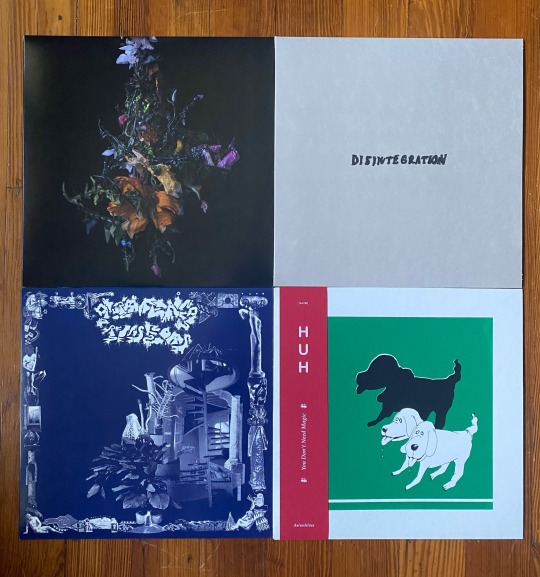
Live from June 2023, already, and still steadily accumulating plastic to shield me from the sun. Here are four more things you can listen to instead of Elon Musk and four more things you can buy instead of groceries. Crank 'em 'til that stomach rumble is drowned out.
BIG|BRAVE, nature morte LP (Thrill Jockey)
Their lineup now solidified over the course of the past few records, BIG|BRAVE picks up right where they left off on 2021's underrated Vital with nature morte. The record snaps open with Robin Wattie's vocals, and it's a harbinger of things to come: she's solidly up front flexing her vocal range, seemingly more confident and in control than ever. While still glacial and capable of whittling rock to dust, nature morte feels more accessible, in part due to Wattie's performance, but the guitars are more airy, allowing the soft, bright colors of the cover to bleed into the performance. There's an actual groove at the midpoint of "carvers, farriers and knaves," and my favorite track, "the one who bornes a weary load," begins with the post-rock atmosphere by way of '00s screamo. Of course, the band's bread and butter is still this absolutely crushing, cavernous one- or two-chord riff augmented by feedback, crashing drums and Wattie's vocals elevating to a full-on roar; they just utilize it more sparingly. What else has changed over the last two albums is how the band approaches the build-up to these climaxes, and how they can sound as disciplined as they do unpredictable. On "the fable of subjugation," for example, the band leads you face-first into a cold metal wall after the relatively calm textural intro, an un-subtle reminder to stay focused. When the loud part kicks in on "a parable of trusting," it almost sounds like vintage BIG|BRAVE until the guitar chords start to meander and sway, a simple and unbearably powerful show of restraint amidst the onslaught. This is a room-flattening/room-silencing record, the quiet parts captivating and the loud parts leaving craters behind when they strike. But in other ways, this feels like the band becoming more comfortable and confident expressing through texture and mood. To me, the trajectory of BIG|BRAVE feels much like Thou's over their first few years (from Tyrant to Summit, for instance), in that the two groups remained as heavy as ever while becoming more interested in creating an atmosphere, and not just churning endlessly in the sludge-y murk. I'm not big on where Thou went with their sound in recent years, and it could be that BIG|BRAVE is heading down a similar path; but for now, I'll enjoy nature morte and the sound of a band at the peak of their powers.
Disintegration, Time Moves For Me 12" (Feel It)
Fantastic debut from this new Cleveland trio, featuring the inimitable Haley Himiko from Pleasure Leftists, as well as Noah Anthony (Profligate), and Christopher Brown from Cloud Nothings. Disintegration operates in this darkwave/almost-EBM space, and it's solid ground for Himiko to sway and prowl over. The title track has her absolutely going off over an arpeggiated beat, and the acrobatics she pulls out on the chorus hit home every time. The slower tempo of "Carry With You" is another showcase for her vocal range; the combination of the heavy backbeat's gravity and the chopped treated vocals sounds like the track's being pulled under by its own weight. The record closes with "Make a Wish," which sounds like it could've almost been on the last Pleasure Leftists album, Himiko's vocals soaring over the airy, slicing backing track. The four tracks here are over too fast, an almost cruel tease; even "Hit the Face," the only track not to feature Himiko's vocals, connects on some animal level and gets the knees pumping and neck twisting, the coda not nearly long enough. Highest recommendation; please invite me to any party that's gonna be blasting tracks from this 12".
Glittering Insects, s/t LP (Mind Meld)
Total Punk sub-label Mind Meld is back with a vengeance this year, releasing a new Lavender Flu 12" and this debut Glittering Insects LP. The band features vets from Atlanta's underground: Greg King, Ryan Bell and Josh Feigert, who have recording solo and in bands like GG King, Uniform, Predator, etc. Can't say I'm all that familiar with any of their previous output, though it's been in my periphery for years. In any case, none of that prepared me for how powerful the meeting of the minds would be on Glittering Insects. This is very scuzzy, satisfying Am Rep or Dino Jr.-style rock with flecks of black metal ("Kratom Portal," "Calcified Time") and plenty of noise obscuring the vocals and the ground. The first five tracks, from the caustic noise of "Nuclear Rivers" to the tremolo-picking overlaying creaky keyboards on "Labyrinth Funnel," set the stage for what's to come, which is basically a survey of guitar rock from the past 30 years or so. The second track, "Silent Dream," is my favorite song of the year so far. The main riff gets stuck in my head for days at a time, and the slyly catchy vocal melody just barely pokes out amidst the din. Elsewhere, the band churns out menacing noise rock on "Peatgurgling"; attempts a Rudimentary Peni impression on "Obscure World After Death"; and reaches guitar worship heights currently only achievable by Cheater Slicks on the instrumental "Glittering Insects." My very minor quibble would be that "Dream Journal 12/8/21" doesn't quite fit and kicks me out of the dusty, thrilling orbit the rest of the record pulls me into, seeming much less complete than the rest of the album's tracks. It's just about the shortest track, and had I not listened to Glittering Insects many times over already, I probably wouldn't think to mention it. No matter - this is some real deal, clenched teeth exhilaration, a tour de force with the chops, energy and just the right amount of reverence to match its ambition.
HUH, You Don't Need Magic LP (An'archives)
An'archives has been busy the past few years, selecting the Japanese sub-underground sounds that pass muster and bringing them to the masses in beautiful editions. HUH is yet another new-to-me outfit, though apparently they've been around since 2007. The duo of Kyosuke Terada and Takuma Mori is based around guitar and drums, it sounds like, but there's a healthy dollop of electronics (as there must be) and warped, free vocalizations. If that sounds like Lightning Bolt to you, you're in the ballpark, but the band more often goes for low density: stretching out slow, twisted grooves ("Greenish Fog In You") or restrained relative calm recorded by haunted equipment ("Lousy Smirky," which kinda sounds like it could've fit on Sharpen Your Teeth). There are a couple freak-outs that show HUH paying fealty to their Rhode Island forebears, of course - go no further than the raucous "Spilled Beer" for your fix. What's more interesting is that there is a palpable joy on You Don't Need Magic; one that, to me, rarely comes across on most guitar-drum duo records. They emphasize exuberance over aggression, appear to harness the complete freedom from expectation, and possess the wordless communication between two musicians operating on a plane above most. You Don't Need Magic impresses on a number of levels, and if the way "Bitter Summer" rips apart at the halfway point to close out the album doesn't have you flipping the record over for more - you may need magic.
#Big Brave#HUH#An'archives#Disintegration#Feel It Records#Glittering Insects#Thrill Jockey#Mind Meld
11 notes
·
View notes
Text
244: Califone // Quicksand/Cradlesnakes

Quicksand/Cradlesnakes
Califone
2003, Thrill Jockey (Bandcamp)
The easiest elevator pitch for Califone is Yankee Hotel Foxtrot-era Wilco if that band had drifted further from pop hooks into the primeval electroacoustic murk that shaded the edges of those recordings. Califone predate their fellow Chicagoans’ dalliance with the avant-garde, however, and it makes sense to see both bands as contributors to and products of the particular fusion of folk, electronic, jazz, and experimental music that Chicago has been known for since the late ‘80s.
I’m a big Califone fan, and 2003’s Quicksand/Cradlesnakes is one of the peaks of their discography. I would describe the band as bigger on texture than flavour—the tracks feel quilted from bits of field recordings and library samples, full of rattling percussive sounds and electronic warbling. From this stew tunes do arise, glitchy ghost images of acoustic folk songs that feel as though a thoughtful machine has attempted to reconstruct a battered shellac 78. Bandleader Tim Rutili sings streams of disconnected imagery in a voice barely above a whisper, and while he’s no technician, he suits the project’s understated but emotive tone.
On some of the band’s subsequent albums, like 2006’s Roots & Crowns (their masterpiece) and 2009’s All My Friends Are Funeral Singers, Califone would become a bit more tuneful, but the seeds are already there on Quicksand. The brief “Million Dollar Funeral” and “Mean Little Seed” are nearly straight Appalachian (indie) folk, while the bluesy “The Day Leon Spinks Moved Into Town” has a creeping groove that opens up space for some ripping guitar jams; “Vampiring Again” puts me in mind of Wilco’s “Kamera” before it reveals itself to be something deeper and stranger.
244/365
youtube
#califone#thrill jockey#chicago music#chicago#wilco#'00s music#indie rock#folktronica#library music#red red meat#music review#vinyl record
0 notes
Text
Red Fang, Windhand, & Pelican Live Show Review: 10/29, House of Vans, Chicago

BY JORDAN MAINZER
In what has become an annual tradition, Wolfbat Studio's Dennis McNett has put on Hallowolfbat, a self-described “visual conjuring” involving enormous, spooky puppets and costumes, featuring performances by various metal bands. Saturday night at House of Vans in Chicago, with plenty of crowd members (and even some band members) dressed up, Portland hard rockers Red Fang, Richmond doom greats Windhand, and local instrumental heroes Pelican provided a conjuring of their own to go along with a decked out venue.

The headliners were Red Fang, whose most recent album is the pandemic-delayed Arrows (Relapse) from last year. They performed a couple tracks from the record, like the grunge-adjacent (and quintessentially hilariously titled) “Unreal Estate”, but perhaps as the show was somewhat of a one-off, special event, they prioritized their back catalog. From the rolling rock of Murder the Mountains’ “Malverde” to Whales and Leeches’ supremely catchy “Blood Like Cream”, Red Fang were clearly the most throttling band of the night, combining the camp of Halloween with real thrills in the form of bluesy sludge and mighty riffs. Bryan Giles and Aaron Beam’s dual vocals on “Into the Eye” were the forceful complement to John Sherman’s thunderous drums. “Prehistoric Dog” was every bit the bloodthirsty, hook-filled, should-have-been-a-hit anthem it was since it led off the band’s self-titled compilation album. On the feline end of the animal spectrum, before playing two-and-a-half-minute burner “Hank is Dead”, Giles called out the person in the crowd wearing a costume consisting of a grave with a cat ghost, before declaring, “This song is about that costume.” Ever foreboding and prescient while having loads of fun, Red Fang ruled.


Windhand provided the intangible atmosphere between the technical peaks and valleys of Pelican and the catchy brutalism of Red Fang. Entering the stage to sounds of menacing organ, creaking floors, and maniacal laughing, as well as--what else--a strong smell of burning incense, the band gave a stellar set of creeping doom. Live, singer Dorthia Cottrell’s voice was further obscured in the mix behind Garrett Morris’ piercing wah wah guitars, echoing and spectral. Parker Chandler’s crunchy bass and Ryan Wolfe’s strong, deliberate drumming were the ultimate backbone on songs like “Libusen” and Eternal Return highlight “First to Die”. As the band hasn’t released a new studio album since 2018, they played consistently from across their discography, showing how consistently brooding their material is.


As for Pelican, they’re looking forward by looking back. For one, this year, they reissued their debut album Australasia via Thrill Jockey and are set to do the same with City of Echoes next year. Originally released via Hydra Head and long out of print, the albums both contain Josh Bonati remasters, and the latter a bonus LP of demos, alternative takes, and tracks from the rare Pink Mammoth EP. Best, they’ve welcomed back Laurent Lebec, their original guitarist. Saturday night’s highlights included setlist opener and Echoes highlight “Dead Between the Walls” and Australasia’s slow, twinkly, gorgeous title track and tempo-changing “Drought”. Each string player in the band showed off their own performative style--guitarist Trevor de Brauw preferred headbanging, bassist Bryan Herweg grooving, Lebec bouncing--but offered a collective storm. They made the guitars sound like stabbing jolts of lightning or sirens, as Larry Herweg’s drums built up and crashed. Of all the artists, bands or puppeteers, Pelican were the true wizards.

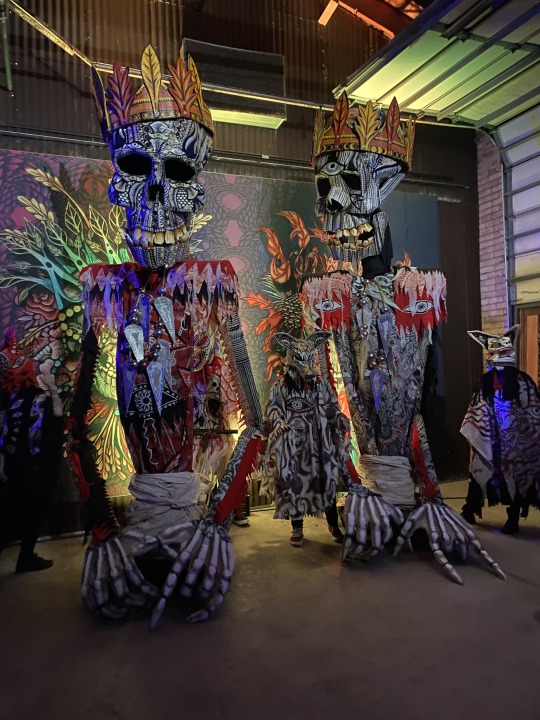
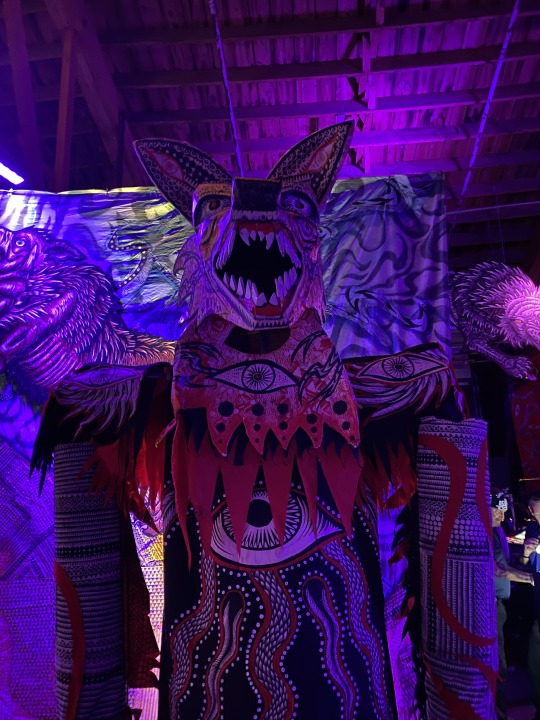

#live music#red fang#windhand#pelican#house of vans#wolfbat studio#dennis mcnett#parker chandler#laurent lebec#relapse#thrill jockey#hallowolfbat#relapse records#arrows#murder the mountains#whales and leeches#halloween#bryan giles#aaron beam#john sherman#dorthia cottrell#garrett morris#ryan wolfe#eternal return#australasia#hydra head#city of echoes#josh#pink mammoth#trevor de brauw
1 note
·
View note
Audio
Thalia Zedek – Been Here And Gone (2001)

https://www.matadorrecords.com / https://www.thrilljockey.com
#thalia zedek#matador records#been here and gone#2001#2000s#usa#thrill jockey#bryce goggin#rock#indie rock#fred kevorkian#Beth Heinberg#daniel coughlin#mel lederman#chris brokaw#david michael curry#audio#leonard cohen#luiz bonfa#gary gogel
0 notes
Text

This was a fun little project I found on @suugrbunz posts and I thought it would be fun to practice with this prompt. Hope you like it!
Prompt idea to practice your writing otp (ocs or fandom) — it'd be so cool since a lot of us write BoB fandom related content. So it can be interrupted as a modern au or !! Write your couples when they have grown old together
~💚~💚~💚~💚~💚~💚~
Upon returning from Europe after the war came to an end, you and Joe Liebgott had enough points for Honorable Discharge then came back to America after having served together in Easy Company ready to begin your lives as an exclusive couple. You both agreed that California would be the proper place to settle together. With the finances you each earned overseas, you bought a modest home with all the trimmings and furniture to fill it with.
June 1946
A representative from a popular local radio station visited your home to invite you and Joe for a live broadcast interview about your experiences together as a couple while deployed. The man explained it would be a real human-interest story and the American public would love to hear it. After a little bit of coaxing, you convince Joe to do it with you.
You and Joe seated next to eachother across from the record jockey who would be interviewing you. The interview simply went as follows:
Record Jockey (RJ): So, are you two a couple?
Y/N: We are a couple. *Proudly smiling*
Joe: *Nods with a grin*
RJ: Would you mind telling us the story of how you two met?
*You’re hesitant at first because women serving in the military was quite frowned upon, but nonetheless would still be overjoyed to tell the story. Joe would only be looking to you to do all the talking. He loves hearing your voice, and just stares at you admirably*
Y/N: We both enlisted in the Army at the same time and met at Camp Toccoa, GA. I trained with the Paratroopers and the medic training unit while we were there and was assigned to Easy Company where Joe also was.
RJ: When was that?
*Joe is better with numbers than you, so you hum in thought then look at Joe to help you out*
Y/N: June....? July...
Joe: July 1942
RJ: What was your first impression of each other?
*You smile coyly at Joe, narrowing your eyes at him. Joe would be slouching in his seat, not very thrilled to be there in the first place, but perks up a little at the question meeting your gaze affectionately*
Y/N: He was smug, and overconfident. A real wise guy with a mouth that needed a good bar of soap. My initial impression of Joe was that he was nothing but trouble. And you know what? I was right about that, (Y/N giggles) but after spending all those years with him overseas, I discovered how charming he could be. And how honorable of a soldier he was in the field.
*Joe grins adoringly at you. Grabs your hand and squeezes*
Joe: At first, I thought she was a pain in the....
RJ: Mr. Liebgott! Please, we’re live!
Joe: -right...uh, pain in the rear. Whenever me and the guys did somethin’ we weren’t supposta’, she’d always be naggin’ us. Ya know, like a parent? Thought she was going to fall behind a lot and complain about getting dirty or having to fire the M-1. She didn’t complain about the work, the filth, the sweat, the tears or the heat. None of it. She pushed through like any of the guys did. I read her all wrong in the beginning.
*Your eyes meet and exchange smiles*
RJ: How many years have you been an item?
Y/N: Well, the rest of the guys considered us an ‘item’ long before we dropped into Normandy. But I’d say exclusively since late June 1944. After all the near-death experiences, we definitely had a stronger bond.
*Joe just nods in agreement*
RJ: Joe, we haven’t heard too much from you. What's your favorite thing about Y/N?

*Y/N looks over at Joe expectantly, smirking because she knows he doesn’t really like to talk about feelings*
Joe: *Long exhale, kind of stares out into space thinking* Well...she’s a knockout. Just look at her. *Gestures to Y/N sitting next to him blushing* I love that she can look the way she does and still be as strong as any of the guys in Easy.
*He looks you over and winks at you making the butterflies in your stomach dance*
RJ: So, was there a first date?
*You and Joe both look at eachother inquisitively, each squinting at one another as if trying to search the other’s thoughts for an answer. You shrug*
Joe: What about that night at Toccoa when we snuck out after lights out, and walked Curahee? Think that counts?
Y/N: Ah, yes! It was so hot and humid, and neither of us could sleep on those kinds of nights-
Joe: Mid-August 1943
Y/N: -so we both snuck out of billeting to get some air after TAPS and bumped into eachother behind the mess hall. So, it was an impromptu first date. We ended up walking the Curahee trail up the mountain where we always did our awful company runs. But you could see the stars perfectly up there.
*Joe nods*
RJ: So, with the war having brought you together and the experiences having made you two inseparable, any plans to make Y/N ‘Mrs. Liebgott?’
*You hiccup clutching your pearls. Joe chokes on saliva and chuckles nervously*
Joe: *Scratching the back of his head* I think that goes without sayin’--
RJ: How about little Liebgotts?
*Sweat forming on Joe’s forehead, you sense his panic*
Y/N: Joe and I have the same ambitions planning for our future. That will include marriage and starting a family. Right now, we’re relishing eachother living peaceful lives after the chaos of the war. We’re in no hurry.
*You look over at Joe, and he directs a grateful smile to you for rescuing him*
RJ: You heard it here first, ladies and gentlemen! From the treacherous depths of war love still prevails! Thank you for sharing your story with the public! It’s lovely to see this point of view about the war than from what we’ve only heard or seen in the news. What a story!
The End
#band of brothers#joe liebgott#ross mccall#101st airborne#ww2#joseph liebgott#easy company#501st battalion#joe liebgott rabbit hole#joe liebgott brain rot#joe liebgott sends me#joe liebgott x reader#joe liebgott imagines#medic#valentines aesthetic#valentines day#be my valentine
22 notes
·
View notes
Text
THE BODY & DIS FIG
TO WALK A HIGHER PATH
[ORCHARDS OF A FUTILE HEAVEN, FEB 2024]
#RELEASE RADAR#audio#the body#dis fig#power electronics#noise#doom metal#experimental#orchards of a futile heaven#thrill jockey records#electronic#music#HEAVY REPEAT
9 notes
·
View notes
Text

Saturday 16 September Mixtape 371 “Surfing the Tunnels”
Retro Space Electronic Idm
Wednesdays, Fridays & Sundays.
Support the artists and labels.
Don't forget to tip so future shows can bloom.
https://www.mixcloud.com/djsofabed/
Trevlad-Surfing a Drone 00:31
Polypores-Diverging Reality Tunnels 01:31
TALsounds-Conveyor 04:32
Listening Center-Bridge Watching 06:10
Secret Circuit-Simulacrum 09:07
Brennan Fowler-Home 11:16
Orange Crate Art-Diaries from an Alaskan Housewife 17:49
CIALYN-Time Occlusion 21:48
Twilight Sequence-The Colour Of Twilight 25:39
Colleen-November 30:01
Skaefox-space 31:58
Poppy Ackroyd-The Calm Before 32:38
Uncle Fido-They Get Up 38:25
Comtron Soundlab-HOLBORN 9100\9120 - de vele gezichten van het Holborn 39:56
#Trevlad#Polypores#DiN#TALsounds#NNA Tapes#Listening Center#Temporary Tapes#Secret Circuit#Brennan Fowler#Mystery Circles#Orange Crate Art#Future Children#CIALYN#Twilight Sequence#Moonbuilding#Castles In Space#Colleen#Thrill Jockey Records#Skaefox#Poppy Ackroyd#One Little Independent Records#Uncle Fido#Binaural Space#Comtron Soundlab#Infinite Oscillations
3 notes
·
View notes
Text
Ellen Arkbro & Johan Graden — I get along without you very well (Thrill Jockey)

Photo by Miki Anagrius
I get along without you very well by Ellen Arkbro & Johan Graden
These dusky songs sound minimal but contain complexity. Their elements seem sparse at first—a pure unadorned voice, some minor piano chords, the plink of cymbals on widely spaced fours—but gain depth from layered timbres.
Both of these musicians have contemporary classical backgrounds, but here they turn their skills towards art song. Ellen Arkbro, a celebrated minimalist composer who studied with La Monte Young, sings tentative, upward-slanting melodies in a decidedly non-operatic voice. As a singer, she blows her notes out like a reed player, letting tones gain volume mid-attack and shifting around their centers. Her partner in this, Johan Graden, plays piano, synths and clarinet, placing notes carefully and not too closely together. Other instruments join in, subtly expanding on these shadowy ideas—a pair of bass clarinets, a tuba and trombone, a stand-up bass and drum kit. Yet the songs are never busy or over-showy. There is plenty of unused space and time in these compositions.
The simplest and barest of these songs is the first one, “Close,” which opens with Arkbro’s clear, plainspoken voice shadowed by bass clarinet. The bass clarinet plays lower than she sings, but it echoes something fundamental in her delivery. It has a breathy, wheezing quality which lends the sound a subtle depth, like charcoal pencil shading in a line drawing. Over time, the sound thickens with chords of woodwinds which hang shivering in the air, their edges blurred by the buzz of drone, but the song remains pure and unearthly.
At the other extreme is “Love You, Bye,” which starts, as all these songs do, with a stark, but not ungentle simplicity, as voice and woodwinds vibrate in sympathy in close proximity with each other. The drumbeat, though, is syncopated and agile; it dances with playful plunks of bass. And the drone, now including organ, swells and builds to dizzying size, a wild overload of sonic sensations. It is a quiet song that becomes obliterating.
It is easy to get fixated on what makes the sound of this album so unusual—the sense of space and quiet, the subtle merger of timbres, the introspective clarity of its wandering melodies—but that leaves out the important part. These are serene and lovely songs made of disparate parts that join effortlessly together. When you listen, you go to a different place.
Jennifer Kelly
#dusted magazine#albumreview#jennifer kelly#ellen arkbro#johan graden#I get along without you very well#thrill jockey records#minimalism#experimental music
1 note
·
View note
Text
2023 in Books
I need to stop bragging that I’ve got this reading thing all figured out, because man if 2023 wasn’t a year of terrible books. I liked less than half of the 37 I read and nothing quite gripped me in the way it has in years past… but to put it more optimistically I liked a full third of what I read, and the ones I liked best were a fascinating and unexpected silver lining. Without further ado:
Cyrano de Bergerac by Edmond Rostand, trans. Brian Hooker
Tell this all to the world- and then to me. Say very softly that… she loves you not.
I read a couple of plays this year for the first time since college and liked them fine, but there’s a reason this has been adapted five million times. Everyone go watch Megamind right now.
Wylding Hall by Elizabeth Hand
Of all the found footage-inspired horror fiction I’ve read this one makes the best case for existing in its chosen medium, as a 70s UK folk rock band are interviewed about the summer they spent recording what would become their final album [thunder crashes.] It reminded me of a Tana French mystery in its language and ability to make space feel lived-in; the character writing is so strong I realized that at some point I had stopped checking the interview headings to know who was speaking. Hand unfortunately distrusts her audience to read between the lines at a few crucial moments (and ruins what would have been a perfect ending and a deeply affecting scare by gilding the lily, or, in this case, photograph), but I love that she went from seemingly by-the-numbers American YA fiction to a meticulously-researched and truly unique horror novella. Puts other writers working in the genre to shame.
A Kiss Before Dying by Ira Levin
Reminiscent of the best kind of TCM suspense thriller (and was adapted into one), but could only exist as a book for the kind of narrative tactics it employs. Levin is brilliant at setting and character; I think any one of his contemporaries would have leaned into archetypes for this sort of story, and he instead distinguishes his proper nouns in subtle, clever ways that lend them the weight a noir needs. Can’t wait to read more of his stuff!
All the Names They Used for God by Anjali Sachdeva
I’d like to know why this anthology got hit with what a friend has termed a pottery barn throw pillow cover + a ‘the tiny things we know to be small’ title, because the eponymous story isn’t even called that! It’s just The Names They Used for God, and is, appropriately, about two women kidnapped by a religious extremist group. High risk-high reward; I think taken at their base premise the stories could have been insufferable and are instead strange, compelling, and fantastical. There’s a methodicalness and, I don't know, lack of whimsy? to them that’s unusual for fantasy, but also an absence of any one goal or moral in the way Le Guin speaks so highly of. It made me feel the way I did reading and adoring Kelly Link in middle school, and Sachdeva has a much different style that I guess works all the better on adults. My favorite was Robert Greenman and the Mermaid.
Seabiscuit: An American Legend by Lauren Hillenbrand
Someone recommended this to me via Tumblr anon over five years ago, so let me start by saying if that was you I’d like to thank you properly! This book rules! It was written in ‘99 so falls prey to a very specific kind of jingoism, but the mechanics of that are interesting in and of themself. Seabiscuit the animal is a lens through which to view turn-of-the-20th-century America written from the precipice of the 21st; his story told through the expertly-researched biographies of his owner, trainer, and jockey. Hillenbrand is not only a good pop nonfiction historian, but has been a sports writer since the 80s and I never imagined the genre could be so thrilling as I did reading her work. Horse racing is insane and no one should be riding these things btw.
The Age of Innocence by Edith Wharton
It was one of the great livery-stableman’s most masterly intuitions to have discovered that Americans want to get away from amusement even more quickly than they want to get to it.
Wharton came from old money New York*, was deeply disillusioned with it and pined for rational (i.e., even more insane) social and political scenes, had myriad thoughts about women and gender relations, and held a love for interior design. I learned all of this after reading but it’s apparent on every page; deeply funny and perceptive, fantastic use of language, the moments where it lost me completely nothing if not interesting. What sticks with me the most are a flair for the operatic and an ability to voice both the feeling and consequences of losing oneself to imagined scenarios. Read the pink parasol scene.
*Ancient Money New York; the saying ‘keeping up with the Joneses’ is apocryphally attributed to her father’s side of the family
Owls of the Eastern Ice: A Quest to Find and Save the World's Largest Owl by Jonathan S. Slaght
We’d return to our camp to huddle in the freezing tent and wait for our owls in silence, like suitors agonizing over a phone that never rings.
One of the better pieces of science writing I’ve read in a long time, as Slaght frames rural communities as a quintessential part of ecology rather than a barrier to it. His style is amiable and matter-of-fact (sometimes overly so; the amount of metric GIS directions, help), but he's super engaging and clearly holds just as much compassion for people and history as he does animals and natural landscapes. The Blakiston’s fish owls he’s studying are described as unreal, with hoots so low and quiet it sounds like someone has thrown them under a blanket. You can listen to them here.
Piranesi by Susanna Clarke
Took my breath away and surprised me in a way a book hasn’t in years. I'd read Clarke’s 2004 novel when I was maybe fourteen and had vaguely positive but mostly neutral memories of it, and Piranesi being sci-fi-fantasy that came recommended by Tiktok had me very dubious. I ended up devouring it in the way I haven’t read books since I was fourteen; more of a mystery than the suspected high fantasy, with characters I would do disservice to in trying to describe in brief. While the mystery isn’t difficult to ‘solve’ (I’d argue the book also skews young!), the story ends in a way that’s both deeply unexpected and in the only way it could have.
Honorable mentions
The Count of Monte Cristo by Alexandre Dumas, trans. Peter Washington
[Jigsaw voice] Every man has a devouring passion in his heart as every fruit has its worm.
I spent so much time running my mouth about this one on Tumblr there’s really not much left to say. I think it’s a work of genius that was physically exhausting to read, and I’m sticking it with the honorable mentions mostly because I remember The Three Musketeers being the better book. If you want to read Dumas- and you should- start with that one.
Jonny Appleseed by Joshua Whitehead
I would’ve liked this more had I read it in my late teens/early 20s, but I still think it’s pretty good and would absolutely recommend to anyone in that age bracket. Things that normally annoy me about philosophical first-person lit fic didn’t matter under the weight of Jon’s narratorial voice. He reminded me a little of Lynda Barry’s Maybonne in his understanding and depictions of community and family; his stream of consciousness letting contradictions sit rather than trying to explain them away (Whitehead also makes sex very prosaic and pretty-sounding while still being frank and gross about it, which is a rare talent!)
The Seeds of Life: From Aristotle to da Vinci, from Sharks' Teeth to Frogs' Pants, the Long and Strange Quest to Discover Where Babies Come From by Edward Dolnik
This one fell in the rankings because the writing isn’t my favorite (think early days Vulture article rather than NYT), but I cannot stop referencing it in conversation. I want to read the whole thing to people and make them understand how truly unfathomable it is not only that every one of us is the product of 1 sperm and 1 egg, but that anyone ever figured out how that process works. When Western Europeans first started using microscopes they studied water; there were gross little bugs in there to watch and enjoy, so when semen was revealed to have its own bugs no one was shocked, but they also weren’t impressed. We would not see one enter an egg until EIGHTEEN SEVENTY-FIVE.
Killer Dolphin by Ngaio Marsh
The Malaise of First Night Nerves had gripped Peregrine, not tragically and aesthetically by the throat but, as is its habit, shamefully in the guts.
Has made it into my top 5 favorite Inspector Alleyn mysteries. I’m not keen on Marsh’s theater settings (and there are a LOT of them), but a convoluted setup made this one all the more rewarding. The final revelation as to a point of blackmail is visceral and bizarre in a way I haven’t seen from her before.
The Wretched of the Earth by Frantz Fanon
We all have dirty hands; we are all soiling them in the swamps of our country and in the terrifying emptiness of our brains. Every onlooker is either a coward or a traitor.
Best read in conversation with other writers, I wouldn’t recommend Fanon as the end-all-be-all introduction to communist and socialist thinking (the fact that he inadvertently describes what was going wrong with the USSR at time of writing is fascinating), but he explicitly invites that conversation and the value and impact of his work really can’t be overstated. Our points of disagreement tend to be in regard to nationalism, not his condonation of violence.
Persuasion by Jane Austen
Fascinating to see how Austen was thinking about relationships near the end of her short life. I laughed to see the idea of preferring your brother-in-law’s family to your own was back in full force from my own favorite Emma, as well as an eleventh-hour ‘maybe I should ship the villains??’ My biggest issue is that, like Emma, Persuasion is written in third person limited narration, but Anne is fundamentally Good™ so doesn’t need to learn anything about herself or the world; critic Bob Irvine points out that she and her dashing, misogynistic sailor are beset rather than changed by it. That said I love a people being beset by people (concussed temptresses) places (Bath) and things (cars), and Austen's writing style is really firing on all cylinders here.
#i say 'nothing quite gripped me' but i'm still pretty fresh off some of these so remains to be seen in the long run!#(e.g i always end up wanting to swap at least one finalist and one honorable mention looking back at last year's list)#also as always these aren't ranked- just loosely grouped by date read#books#2023
14 notes
·
View notes
Text
Two Lives Long Harnessed Together, Until One Could Not Go On
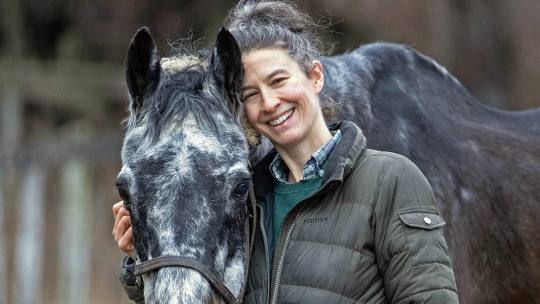
Rush may have been the longest-lived thoroughbred in American history when he died at 39. For three decades, his owner said, “He would fight for me, and I would fight for him.”
A New York Times Article, written by Mike Wilson, published on Nov 22, 2022.
WINDSOR, Conn. — Bridget Eukers paused in the barn, her thoughts seemingly far away, and touched her horse’s halter like an amulet. On the floor just outside his empty stall lay a scattering of yellow chrysanthemums left by a sympathetic friend.
Eukers explained she hadn’t often used the halter on the horse. She and Rush had an understanding.
“I would only really put it on to exercise him because we could go in and out of the barn without it,” she said, her fingers lingering on a strap. “I would just put my hand on his mane and we’d walk in and out.”
It had been just over a week since Rush had died on the concrete floor a few feet from where she stood. Eukers was still grieving, but also celebrating Rush’s extraordinary legacy. He was 39 years and 188 days old when he died, making him perhaps the longest-lived thoroughbred ever in the United States.
The record is hard to pin down. The Jockey Club, the industry’s breed registry, does not keep longevity statistics, so people in horse racing go by word of mouth. The horse thought to be the previous American record-holder was 38 years and 203 days old when he died in 2016, according to the racing publication BloodHorse, which first reported Rush’s death. An Australian thoroughbred lived to be 42, according to Guinness World Records. A typical thoroughbred lives into its late 20s.

Whatever Rush’s rank among senior horses, his death marked the end of a 30-year partnership — Eukers’s word — with horse and owner showing a level of dedication to each other that would be extraordinary for any two beings, equine or human.
“He would fight for me, and I would fight for him,” Eukers said. “Whether it’s your relationship with your horse, with your friends, or with your life partner, that’s what it comes down to. You’ll fight for me, and I’ll fight for you.”
They forged their relationship competing in equestrian events. Six days a week for six years, separated only by a saddle, they honed their skills, moving fluidly together and soaring over obstacles, three feet high at first and then three and a half. For Eukers, being with her horse became a way of life.
She attended college close to home so she could stay near Rush, turned down jobs that would have cut into her time with him, didn’t socialize much and never went on vacation. The longest she ever spent away from Rush was one week, for a school trip.
In return, he gave her joy by carrying her on his back — around show rings and across Windsor’s quilt of farmlands, often at a thundering pace fit for a racetrack. “It really is a special thrill to feel a racing thoroughbred at full speed underneath you. It’s just magic,” she said.
Beyond that, he gave her a purpose, and a measure of peace. The simple routines of feeding Rush, cleaning his stall and giving him medicine made her feel useful and freed her mind. He was a job she loved doing. “It’s one of those Zen things,” Eukers said. “You have that rhythm, and it somehow centers your life.”
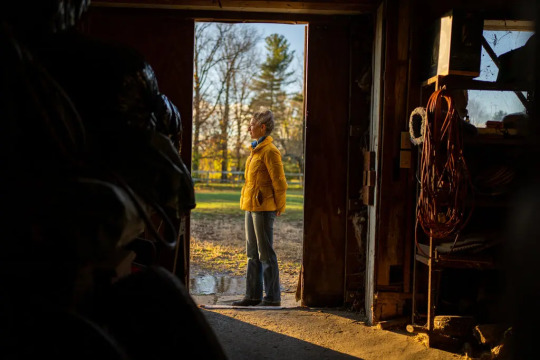
Through all of life’s challenges — angst about the prom, hard days at work, dates that didn’t happen, her father’s death — Rush was there for her. Eukers said she occasionally wept into his neck. He actually didn’t love that.
“He would sit and listen,” she said, “but he would get to a certain point that was like, ‘OK Mom, you cried. We’re good. I’m going to go have my hay now.’”
The horse who became known as Rush was foaled in Kentucky on May 4, 1983. He was sold as a yearling for $60,000 ($170,000 today) and registered as Dead Solid Perfect. He ran 16 times and won once, in 1986 at the Meadowlands, according to the horse racing statistics site Equibase, with the Hall of Fame jockey Julie Krone up. After his racing career, he was sold to a new owner and trained in dressage.

Eukers’s parents bought the horse for her when she was in her early teens. Already named Rush, he was a beautiful athlete, Eukers said, with massive shoulders that swayed like a lion’s when he walked. He was also a scaredy cat, unnerved at different times by flowers, squirrels and a mosquito lamp.
“His mission in life at that point was to worry about things and he was really good at it,” Eukers said.
They grew to understand each other. She fed and groomed him and protected him from everyday objects. And when she asked him to clear a fence, he did, even though he was afraid.
“If I asked him to try, he would always try, and he would try and try,” she said. She still keeps the ribbons they won in riding competitions.
Eukers believes Rush’s diet contributed to his longevity. At 30, he indicated that he wanted a change from commercial horse feed. (“He started to tell me: ‘You know what? This just doesn’t work.’”) She began giving him organic meals of alfalfa pellets and whole grains. When the grains were too hard for Rush to chew, she turned them to mush in a slow cooker.

Last week, she still had two bags of bright green hay in the back of her car. It was made for guinea pigs, but Rush liked it.
Eukers stopped riding Rush when he was 35. He was still able to carry her, she said, but she now had a different priority: Her father had been diagnosed with a terminal illness. Caring for Rush had to be balanced with researching treatments for her dad and just being with him. When her father died in 2019, she said, Rush was no longer fit to be ridden.
The once-brown horse was now mostly gray. He spent his days at Windsor Hunt Stables under an apple tree, communing with dogs named Wilson and Lola, red-winged blackbirds, wrens, a yellow barn cat and a quarter horse called Cowboy, who stole his hay.

Day after day, Eukers walked Rush up and down the little hill next to the barn, steering him away from the gravel path because the stones hurt his feet. She massaged him with essential oils while he napped. She tied a rope to him and had him trot in a circle around her. She experimented with all kinds of dietary supplements, and Dr. Michael Stewart, Rush’s veterinarian for more than 20 years, gave him steroids to keep him strong.
People would ask Eukers how old Rush was, and when she told them, they would follow up with what she considered an indelicate question: “How long do horses live?”
Last summer, Rush somehow hit his head when he was alone. Eukers could tell by the swelling and his behavior. It took him a long time to recover. He also suffered from an abscess on his left front hoof and persistent breathing difficulties. Amid it all, Cowboy, his companion of 14 years, died at 26, leaving Rush bereft.
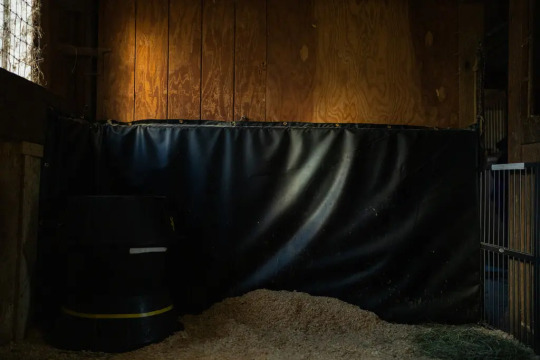
About that time, Eukers, who worked in administration for an aerospace company, began receiving frequent texts at work alerting her that Rush was lying down, and she’d have to hurry to help him.
It is fine for horses to lie down, Dr. Stewart said in an interview, but because of the way their digestive systems work, they must get up to survive. Eukers always managed to get Rush back on his feet, often with help, but as time passed she felt less and less comfortable leaving him alone. She began to spend nights in the barn, placing a chair outside Rush’s stall and wrapping herself in horse blankets as she listened to his breathing.
“You and I would be lucky to have somebody care for us like she cared for him,” Dr. Stewart said.
On the night of Nov. 7, Eukers stayed with Rush until late, then went home to get a couple of hours’ sleep in her bed. When she returned at 5:30 a.m., Rush was down, spilling out of his stall onto the cold barn floor. Eukers called her mother, then Dr. Stewart. For hours they worked to get him up, but the cramped space and the slope of the floor worked against them.
In recent years, Eukers said, people often told her that animals can sense when they are dying. He’ll tell you when it’s time, they would say to her. But Rush didn’t do that, she said. Even after she rubbed his forehead and told him, “You’ve done enough, you don’t have to try anymore,” he kept struggling to lift his head and scrabbling to get his feet under him.
Finally, Eukers asked Dr. Stewart if he thought this was the end, and when he said yes, she made her decision. She had fought for Rush as long as she could. She knew that even if they got him up, they would be back here again soon, and Rush would be suffering, and he would try for her again.

#horse#ottb#thoroughbred#horse racing#dead solid perfect#nytimes#horseblr#equestrian#dressage#tw animal death#tw horse death#tw death#long post
93 notes
·
View notes